- Home
- Tahereh Mafi
Defy Me Page 2
Defy Me Read online
Page 2
“I mean, it’s possible,” she says. “But The Reestablishment doesn’t have a long history of caring about pretenses. They stopped pretending to care about the opinion of the public a long time ago. They mow people down in the street just because they feel like it. I don’t think they’re worried about hiding things from us.”
Castle laughs, out loud, and we all spin around to stare at him. I’m relieved to finally see him react, but he still seems lost in his head somewhere. He looks angry. I’ve never really seen Castle get angry.
“They hide a great deal from us,” he says sharply. “And from each other.” After a long, deep breath, he finally gets to his feet. Smiles, warily, at the ten-year-old in the room. “James, you are wise indeed.”
“Thank you,” James says, blinking up at him.
“Castle, sir?” I say, my voice coming out harder than I’d intended. “Will you please tell us what the hell is going on? Do you know something?”
Castle sighs. Rubs the stubble on his chin with the flat of his palm. “All right, Nazeera,” he says, turning toward nothing, like he’s speaking to a ghost. “Go ahead.”
When Nazeera appears, as if out of thin air, I’m not the only one who’s pissed. Okay, maybe I’m the only one who’s pissed.
But everyone else looks surprised, at least.
They’re staring at her, at each other, and then all of them—all of them—turn to look at me.
“Bro, did you know about this?” Ian asks.
I scowl.
Invisibility is my thing. My thing, goddammit.
No one ever said I had to share that with anyone. Especially not with someone like Nazeera, a lying, manipulative—
Gorgeous. Gorgeous human being.
Shit.
I turn, stare at the wall. I can’t be distracted by her anymore. She knows I’m into her—my infatuation is apparently obvious to everyone within a ten-mile radius, according to Castle—and she’s clearly been using my idiocy to her best advantage.
Smart. I respect the tactic.
But that also means I have to keep my guard up when she’s around. No more staring. No more daydreaming about her. No more thinking about how she looked at me when she smiled. Or the way she laughed, like she meant it, the same night she yelled at me for asking reasonable questions. Which, by the way—
I don’t think I was crazy for wondering out loud how the daughter of a supreme commander could get away with wearing an illegal headscarf. She told me later that she wears the scarf symbolically, every once in a while, that she can’t get away with wearing it all the time because it’s illegal. But when I pointed this out to her, she gave me hell. And then she gave me shit for being confused.
I’m still confused.
She’s not covering her hair now, either, but no one else seems to have registered this fact. Maybe they’d already seen her like this. Maybe everyone but me already had that conversation with her, already heard her story about wearing it symbolically, occasionally.
Illegally, when her dad wasn’t watching.
“Kenji,” she says, and her voice is so sharp I look up, stare at her despite my own very explicit orders to keep my eyes on the wall. All it takes is two seconds of eye contact and my heart hits itself.
That mouth. Those eyes.
“Yeah?” I cross my arms.
She looks surprised, like she wasn’t expecting me to be upset, and I don’t care. She should know that I’m pissed. I want to her to know that invisibility is my thing. That I know I’m petty and I don’t care. Plus, I don’t trust her. Also, what is up with these kids of the supreme commanders all being super-good-looking? It’s almost like they did it on purpose, like they made these kids in test tubes or someshit.
I shake my head to clear it.
Carefully, Nazeera says, “I really think you should sit down for this.”
“I’m good.”
She frowns. For a second she looks almost hurt, but before I have a chance to feel bad about it, she shrugs. Turns away.
And what she says next nearly splits me in half.
Juliette
I’m sitting on an orange chair in the hallway of a dimly lit building. The chair is made of cheap plastic, its edges coarse and unfinished. The floor is a shiny linoleum that occasionally sticks to the soles of my shoes. I know I’ve been breathing too loudly but I can’t help it. I sit on my hands and swing my legs under my seat.
Just then, a boy comes into view. His movements are so quiet I only notice him when he stops directly in front of me. He leans against the wall opposite me, his eyes focused on a point in the distance.
I study him for a moment.
He seems about my age, but he’s wearing a suit. There’s something strange about him; he’s so pale and stiff he seems close to dead.
“Hi,” I say, and try to smile. “Do you want to sit down?”
He doesn’t return my smile. He won’t even look at me. “I’d prefer to stand,” he says quietly.
“Okay.”
We’re both silent awhile.
Finally, he says, “You’re nervous.”
I nod. My eyes must be a little red from crying, but I’d been hoping no one would notice. “Are you here to get a new family, too?”
“No.”
“Oh.” I look away. Stop swinging my feet. I feel my bottom lip tremble and I bite it, hard. “Then why are you here?”
He shrugs. I see him glance, briefly, at the three empty chairs next to me, but he makes no effort to sit down. “My father made me come.”
“He made you come here?”
“Yes.”
“Why?”
He stares at his shoes and frowns. “I don’t know.”
“Shouldn’t you be in school?”
And then, instead of answering me, he says, “Where are you from?”
“What do you mean?”
He looks up then, meets my eyes for the first time. He has such unusual eyes. They’re a light, clear green.
“You have an accent,” he says.
“Oh,” I say. “Yeah.” I look at the floor. “I was born in New Zealand. That’s where I lived until my mum and dad died.”
“I’m sorry to hear that.”
I nod. Swing my legs again. I’m about to ask him another question when the door down the hall finally opens. A tall man in a navy suit walks out. He’s carrying a briefcase.
It’s Mr. Anderson, my social worker.
He beams at me. “You’re all set. Your new family is dying to meet you. We have a couple more things to do before you can go, but it won’t take too lon—”
I can’t hold it in anymore.
I start sobbing right there, all over the new dress he bought me. Sobs rack my body, tears hitting the orange chair, the sticky floor.
Mr. Anderson sets down his briefcase and laughs. “Sweetheart, there’s nothing to cry about. This is a great day! You should be happy!”
But I can’t speak.
I feel stuck, stuck to the seat. Like my lungs have been stuck together. I manage to calm the sobs but I’m suddenly hiccuping, tears spilling quietly down my cheeks. “I want—I want to go h-home—”
“You are going home,” he says, still smiling. “That’s the whole point.”
And then—
“Dad.”
I look up at the sound of his voice. So quiet and serious. It’s the boy with the green eyes. Mr. Anderson, I realize, is his father.
“She’s scared,” the boy says. And even though he’s talking to his dad, he’s looking at me. “She’s really scared.”
“Scared?” Mr. Anderson looks from me to his son, then back again. “What’s there to be scared of?”
I scrub at my face. Try and fail to stop the tears.
“What’s her name?” the boy asks. He’s still staring at me, and this time, I stare back. There’s something in his eyes, something that makes me feel safe.
“This is Juliette,” Mr. Anderson says, and looks me over. “Tragic”—he sighs—�
�just like her namesake.”
Kenji
Nazeera was right. I should’ve sat down.
I’m looking at my hands, watching a tremor work its way across my fingers. I nearly lose my grip on the stack of photos I’m clutching. The photos. The photos Nazeera passed around after telling us that Juliette is not who we think she is.
I can’t stop staring at the pictures.
A little brown girl and a little white girl running in a field, both of them smiling tiny-toothed smiles, long hair flying in the wind, small baskets full of strawberries swinging from their elbows.
Nazeera and Emmaline at the strawberry patch, it read on the back.
Little Nazeera being hugged, on either side, by two little white girls, all three of them laughing so hard they look like they’re about to fall over.
Ella and Emmaline and Nazeera, it read.
A close-up of a little girl smiling right into the camera, her eyes huge and blue-green, lengths of soft brown hair framing her face.
Ella on Christmas morning, it read.
“Ella Sommers,” Nazeera says.
She says her real name is Ella Sommers, sister to Emmaline Sommers, daughter of Maximillian and Evie Sommers.
“Something is wrong,” Nazeera says.
“Something is happening,” she says. She says she woke up six weeks ago remembering Juliette—sorry, Ella—
“Remembering her. I was remembering her, which means I’d forgotten her. And when I remembered Ella,” she says, “I remembered Emmaline, too. I remembered how we’d all grown up together, how our parents used to be friends. I remembered but I didn’t understand, not right away. I thought maybe I was confusing dreams with memory. Actually, the memories came back to me so slowly I thought, for a while, that I might’ve been hallucinating.”
She says the hallucinations, as she called them, were impossible to shake, so she started digging, started looking for information.
“I learned the same thing you did. That two girls named Ella and Emmaline were donated to The Reestablishment, and that only Ella was taken out of their custody, so Ella was given an alias. Relocated. Adopted. But what you didn’t know was that the parents who gave up their daughters were also members of The Reestablishment. They were doctors and scientists. You didn’t know that Ella—the girl you know to be Juliette—is the daughter of Evie Sommers, the current supreme commander of Oceania. She and I grew up together. She, like the rest of us kids, was built to serve The Reestablishment.”
Ian swears, loudly, and Adam is so stunned he doesn’t complain.
“That can’t be possible,” Adam says. “Juliette— The girl I went to school with? She was”—he shakes his head—“I knew Juliette for years. She wasn’t made like you or Warner. She was this quiet, timid, sweet girl. She was always so nice. She never wanted to hurt anyone. All she ever wanted was to, like, connect with people. She was trying to help that little boy in the grocery store. But then it just—everything ended so badly and she got sucked into this whole mess and I tried,” he says, looking suddenly distraught, “I tried to help her, I tried to keep her safe. I wanted to protect her from this. I wanted t—”
He cuts himself off. Pulls himself together.
“She wasn’t like this,” he says, and he’s staring at the ground now. “Not until she started spending all that time with Warner. After she met him she just— I don’t know what happened. She lost herself, little by little. Eventually she became someone else.” He looks up. “But she wasn’t made to be this way, not like you. Not like Warner. There’s no way she’s the daughter of a supreme commander—she’s not a born murderer. Besides,” he says, taking a sharp breath, “if she were from Oceania she would have an accent.”
Nazeera tilts her head at Adam.
“The girl you knew had undergone severe physical and emotional trauma,” she says. “She’d had her native memories forcibly removed. She was shipped across the globe as a specimen and convinced to live with abusive adoptive parents who beat the life out of her.” Nazeera shakes her head slowly. “The Reestablishment—and Anderson, in particular—made sure that Ella could never remember why she was suffering, but just because she couldn’t remember what happened to her didn’t change the fact that it happened. Her body was repeatedly used and abused by a rotating cast of monsters. And that shit leaves its mark.”
Nazeera looks Adam straight in the eye.
“Maybe you don’t understand,” she says. “I read all the reports. I hacked into all my father’s files. I found everything. What they did to Ella over the course of twelve years is unspeakable. So yes, I’m sure you remember a very different person. But I don’t think she became someone she wasn’t. My guess is she finally gathered the strength to remember who she’d always been. And if you don’t get that, I’m glad things didn’t work out between the two of you.”
In an instant, the tension in the room is nearly suffocating.
Adam looks like he might be on fire. Like fire might literally come out of his eyeballs. Like it might be his new superpower.
I clear my throat. I force myself to say something—anything—to break the silence. “So you guys, uh, you all knew about Adam and Juliette, too, huh? I didn’t realize you knew about that. Huh. Interesting.”
Nazeera takes her time turning in her seat to look me in the eye. “Are you kidding?” she says, staring at me like I’m worse than an idiot.
I figure it’s best not to press the issue.
“Where did you get these photos?” Alia asks, changing the subject more deftly than I did. “How can we trust that they’re real?”
At first, Nazeera only looks at her. And she seems resigned when she says, “I don’t know how to convince you that the photos are real. I can only tell you that they are.”
The room goes silent.
“Why do you even care?” Lily says. “Why are we supposed to believe you care about this? About Juliette—about Ella? What do you have to gain from helping us? Why would you betray your parents?”
Nazeera sits back in her seat. “I know you all think the children of the supreme commanders are a bunch of carefree, amoral psychopaths, happy to be the military robots our parents wanted us to be, but nothing is ever that straightforward. Our parents are homicidal maniacs intent on ruling the world; that part is true. But the thing no one seems to understand is that our parents chose to be homicidal maniacs. We, on the other hand, were forced to be. And just because we’ve been trained to be mercenaries doesn’t mean we like it. None of us got to choose this life. None of us enjoyed being taught to torture before we could even drive. And it’s not insane to imagine that sometimes even horrible people are searching for a way out of their own darkness.”
Nazeera’s eyes flash with feeling as she speaks, and her words puncture the life vest around my heart. Emotion drowns me again.
Shit.
“Is it really so crazy to think I might care about the girls I once loved as my own sisters?” she’s saying. “Or about the lies my parents forced me to swallow, or the innocent people I watched them murder? Or maybe even something simpler than that—that I might’ve opened my eyes one day and realized that I was part and parcel of a system that was not only ravaging the world but also slaughtering everyone in it?”
Shit.
I can feel it, can feel my heart filling out, filling up. My chest feels tight, like it’s swollen, like my lungs don’t fit anymore. I don’t want to care about Nazeera. Don’t want to feel her pain or feel connected to her or feel anything. I just want to keep a level head. Be cool.
I force myself to think about a joke James told me the other day, a stupid pun—something to do with muffins—a joke that was so lame I nearly cried. I focus on the memory, the way James laughed at his own lameness, snorting so hard a little food fell out of his mouth. I smile and glance at James, who looks like he might be falling asleep in his seat.
Soon, the tightness in my chest begins to abate.
Now I’m really smiling, wondering if
it’s weird that I love bad jokes even more than good ones, when I hear Ian say—
“It’s not that you seem heartless. It’s just that these photos seem so convenient. You had them ready to share.” He stares down at the single photo he’s holding. “These kids could be anyone.”
“Look closely,” Nazeera says, standing up to get a better look at the picture in his hands. “Who do you think that is?”
I lean over—Ian isn’t far from me—and peer over his shoulder. There’s really no point denying it anymore; the resemblance is insane.
Juliette. Ella.
She’s just a kid, maybe four or five years old, standing in front of the camera, smiling. She’s holding a bouquet of dandelions up to the cameraman, as if to offer him one. And then, just off to the side, there’s another figure. A little blond boy. So blond his hair is white. He’s staring, intensely, at a single dandelion in his hands.
I nearly fall out of my chair. Juliette is one thing, but this—
“Is that Warner?” I say.
Adam looks up sharply. He glances from me to Nazeera, then stalks over to look at the photo. His eyebrows fly up his head.
“No way,” he says.
Nazeera shrugs.
“No way,” Adam says again. “No way. That’s impossible. There’s no way they knew each other this long. Warner had no idea who Juliette was before she came here.” When Nazeera seems unmoved, Adam says, “I’m serious. I know you think I’m full of shit, but I’m not wrong about this. I was there. Warner literally interviewed me for the job of being her cellmate in the asylum. He didn’t know who she was. He’d never met her. Never seen her face, not up close, anyway. Half the reason he chose me to be her roommate was because she and I had history, because he found that useful. He’d grill me for hours about her.”
Nazeera sighs slowly, like she’s surrounded by idiots.
“When I found these photos,” she says to Adam, “I couldn’t understand how I came across them so easily. I didn’t understand why anyone would keep evidence like this right under my nose or make it so easy to find. But I know now that my parents never expected me to look. They got lazy. They figured that, even if I found these photos, I’d never know what I was looking at. Two months ago I could’ve seen these pictures and assumed that this girl”—she plucks a photo of herself, what appears to be a young Haider, and a thin brown-haired girl with bright blue eyes, out of a pile—“was a neighbor kid, someone I used to know but can’t be bothered to remember.

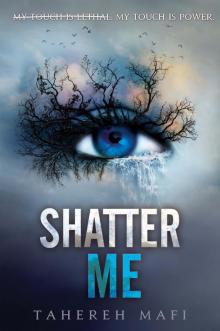 Shatter Me
Shatter Me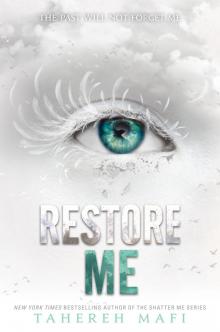 Restore Me
Restore Me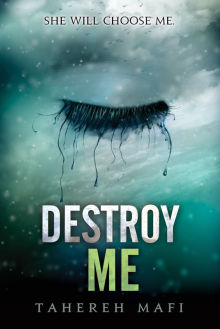 Destroy Me
Destroy Me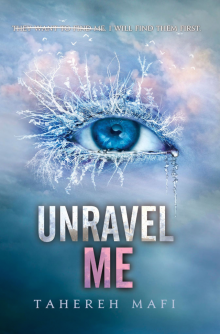 Unravel Me
Unravel Me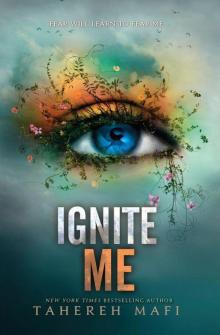 Ignite Me
Ignite Me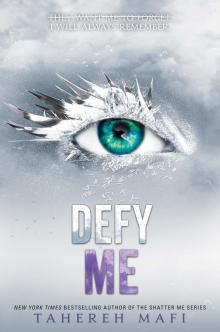 Defy Me
Defy Me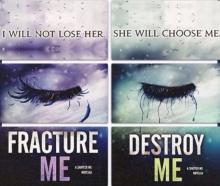 Fracture Me
Fracture Me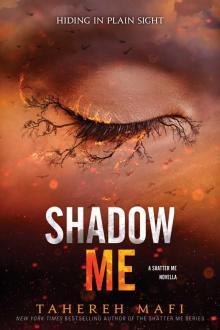 Shadow Me
Shadow Me Whichwood
Whichwood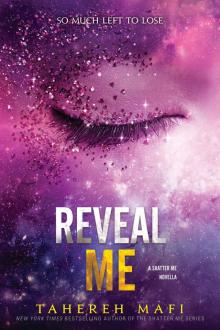 Reveal Me
Reveal Me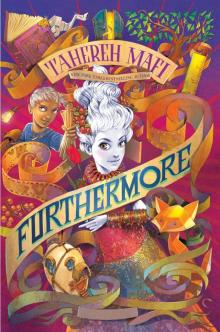 Furthermore
Furthermore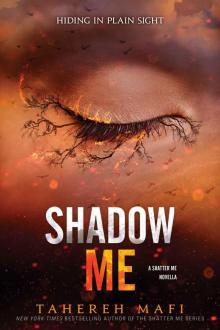 Shadow Me (Shatter Me Novella)
Shadow Me (Shatter Me Novella)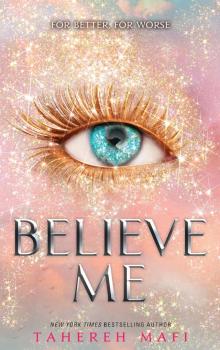 Believe Me
Believe Me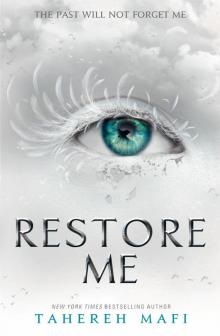 Restore Me (Shatter Me)
Restore Me (Shatter Me)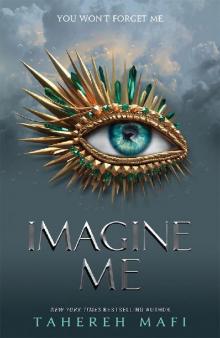 Imagine Me
Imagine Me An Emotion of Great Delight
An Emotion of Great Delight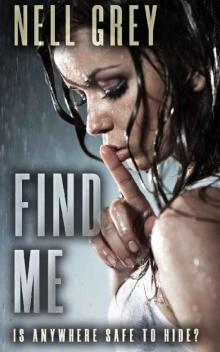 Find Me
Find Me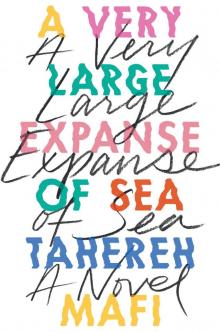 A Very Large Expanse of Sea
A Very Large Expanse of Sea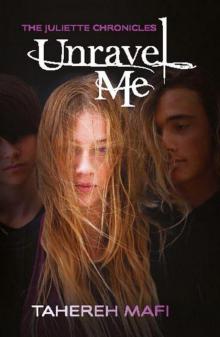 Unravel Me: The Juliette Chronicles Book 2
Unravel Me: The Juliette Chronicles Book 2